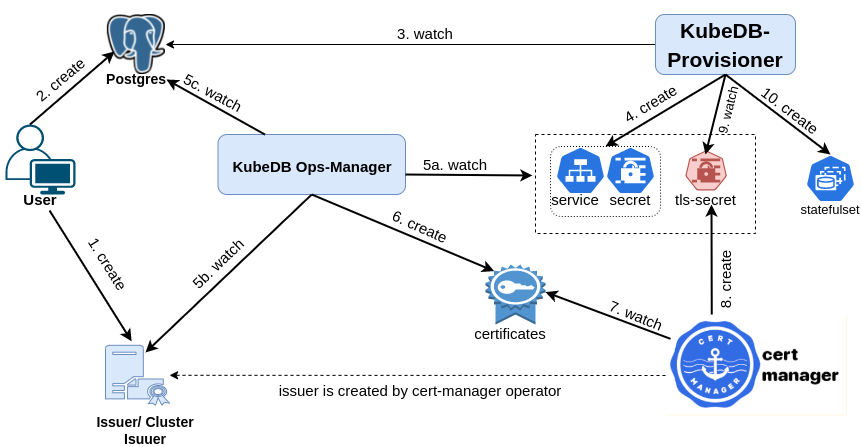You are looking at the documentation of a prior release. To read the documentation of the latest release, please
visit here.
New to KubeDB? Please start here.
Postgres TLS/SSL Encryption
Prerequisite : To configure TLS/SSL in Postgres, KubeDB uses cert-manager to issue certificates. So first you have to make sure that the cluster has cert-manager installed. To install cert-manager in your cluster following steps here.
To issue a certificate, the following cr of cert-manager is used:
Issuer/ClusterIssuer: Issuers and ClusterIssuers represent certificate authorities (CAs) that are able to generate signed certificates by honoring certificate signing requests. All cert-manager certificates require a referenced issuer that is in a ready condition to attempt to honor the request. You can learn more details here.Certificate:cert-managerhas the concept of Certificates that define the desired x509 certificate which will be renewed and kept up to date. You can learn more details here.
Postgres CRD Specification:
KubeDB uses the following cr fields to enable SSL/TLS encryption in Postgres.
spec:sslModetls:issuerRefcertificates
Read about the fields in details from postgres concept,
sslModesupported values are [disable,allow,prefer,require,verify-ca,verify-full]disable:It ensures that the server does not use TLS/SSLallow:you don’t care about security, but I will pay the overhead of encryption if the server insists on it.prefer:you don’t care about encryption, but you wish to pay the overhead of encryption if the server supports it.require:you want your data to be encrypted, and you accept the overhead. you want to be sure that you connect to a server that you trust.verify-ca:you want your data to be encrypted, and you accept the overhead. you want to be sure that you connect to a server you trust, and that it’s the one you specify.
When, sslMode is set and the value is not disable then, the users must specify the tls.issuerRef field. KubeDB uses the issuer or clusterIssuer referenced in the tls.issuerRef field, and the certificate specs provided in tls.certificate to generate certificate secrets using Issuer/ClusterIssuers specification. These certificates secrets including ca.crt, tls.crt and tls.key etc. are used to configure Postgres server, exporter etc. respectively.
How TLS/SSL configures in Postgres
The following figure shows how KubeDB enterprise is used to configure TLS/SSL in Postgres. Open the image in a new tab to see the enlarged version.

Deploying Postgres with TLS/SSL configuration process consists of the following steps:
At first, a user creates an
Issuer/ClusterIssuercr.Then the user creates a
Postgrescr.KubeDBcommunity operator watches for thePostgrescr.When it finds one, it creates
Secret,Service, etc. for thePostgresdatabase.KubeDBOps Manager watches forPostgres(5c),Issuer/ClusterIssuer(5b),SecretandService(5a).When it finds all the resources(
Postgres,Issuer/ClusterIssuer,Secret,Service), it createsCertificatesby usingtls.issuerRefandtls.certificatesfield specification fromPostgrescr.cert-managerwatches for certificates.When it finds one, it creates certificate secrets
cert-secrets(server, client, exporter secrets, etc.) that hold the actual self-signed certificate.KubeDBcommunity operator watches for the Certificate secretstls-secrets.When it finds all the tls-secret, it creates a
PetSetso that Postgres server is configured with TLS/SSL.
In the next doc, we are going to show a step by step guide on how to configure a Postgres database with TLS/SSL.



































